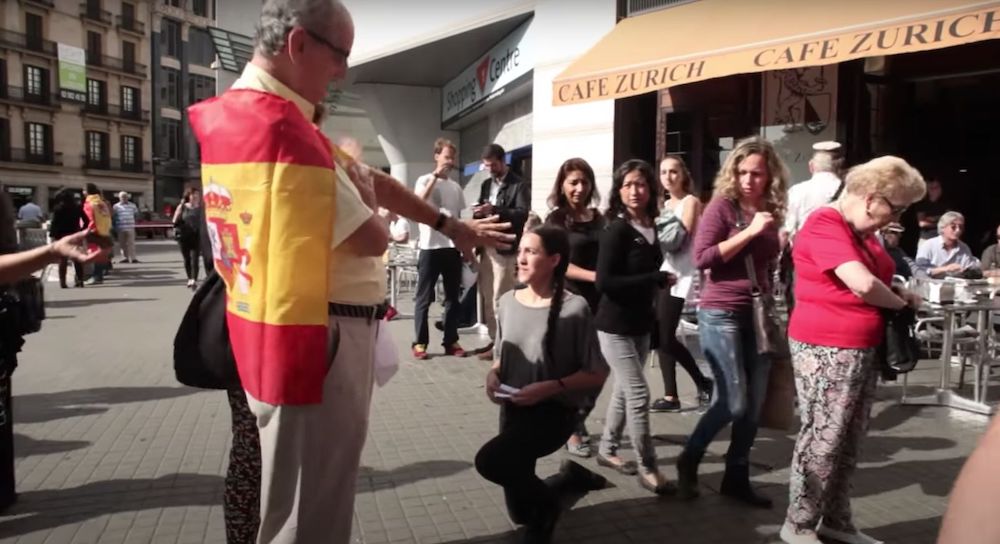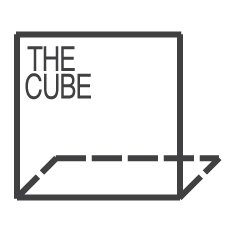
Daniela Ortiz
CP12, 2012, digital video, 9:56 min.
Réplica, 2014, digital video, 4:30 min.
Reparación, 2017-19, digital video, 7:02 min.
TheCube Project Space

On each October 12 from 2012 and 2019, the artist and antiracist activist Daniela Ortiz carried out a series of actions. Set on the date of the so-called “discovery” of America, which Spain marks to celebrate its National Day, the actions reveal the imperial substrate of Spanish identity and promote counternarratives that make visible the silenced experience of the colonized peoples.
This selection of videos brings together three actions carried out in the city of Barcelona. CP12, realized in collaboration with Xose Quiroga, consists of a detailed visual journey that stresses the racist ideology epitomized by the Columbus monument located in the Plaza Colón. In addition to Columbus, the monument commemorates two Catalan figures who actively participated in the colonial process, the priest Bernardo de Boyl and the soldier Pere de Margarit, who are represented next to an Indigenous man kneeling in a sign of submission. Réplica is set in Plaza Cataluña, one of the main public spaces where the National Day is celebrated. Carrying a photograph of the anonymous Indigenous man kneeling under priest Bernardo de Boyl, Ortiz kneels in front of passersby, tries to explain that the Columbus monument reifies racism, and receives some irritated and even violent reactions. In Reparación, Ortiz reads fragments of El primer nueva crónica y buen gobierno (1615), a manuscript by the Indigenous chronicler Guamán Poma de Ayala, that denounces the abuses committed by the Spanish colonizers.
All three actions were recorded on video to be shared by the artist on social media, through which she has consistently given space to forms of anticolonial dissent beyond the art world.
— Curator |Florencia Portocarrero
Daniela Ortiz
(b. 1985, Cusco, Peru; based in Barcelona) Her work aims to generate visual narratives in which the concepts of nationality, racialization, social class and gender are explored in order to critically understand structures of colonial, patriarchal and capitalist power. Her recent projects and research deal with the European migratory control system, its links to colonialism and the legal structure created by European institutions in order to inflict violence towards racialized and migrant communities. She has also developed projects about the Peruvian upper class and its exploitative relationship with domestic workers. Recently her artistic practice has turned back into visual and manual work, developing art pieces in ceramic, collage and in formats such as children books in order to take distance from eurocentric conceptual art aesthetics. Together with her artistic practice she is the mother of a 2-year-old, gives talks, workshops, does investigation and participates in discussions on Europe’s migratory control system and its ties to coloniality in different contexts.
Curator : Florencia Portocarrero
Florencia Portocarrero (Lima, 1981) writes, lectures, teaches, and organizes both exhibitions and public programs. Her research interests are focused on how to rewrite art history from a feminist perspective, regimes of subjectivation in the context of neoliberal globalization, and the questioning of hegemonic forms of knowledge. Between 2008 and 2010, she completed a master’s degree in Theoretical Studies in Psychoanalysis at the Pontifical Catholic University of Peru. Later, from 2012 to 2013, Portocarrero participated in the Curatorial Program of the Appel Arts Center in Amsterdam, and in 2015 she completed a second master’s degree in Contemporary Art Theory at Goldsmiths University in London. She has participated in several international conferences and her writings on art and culture appear regularly in specialized magazines such as Atlántica Journal, Artishock, and Terremoto. In 2017/2018 Portocarrero received the Curating Connections scholarship, awarded by the DAAD Artists-in-Berlin Program and the KfW Stiftung. In Lima, she worked as a Public Program Curator at Proyecto AMIL (2015-2019) and is a Co-founder of Bisagra.


